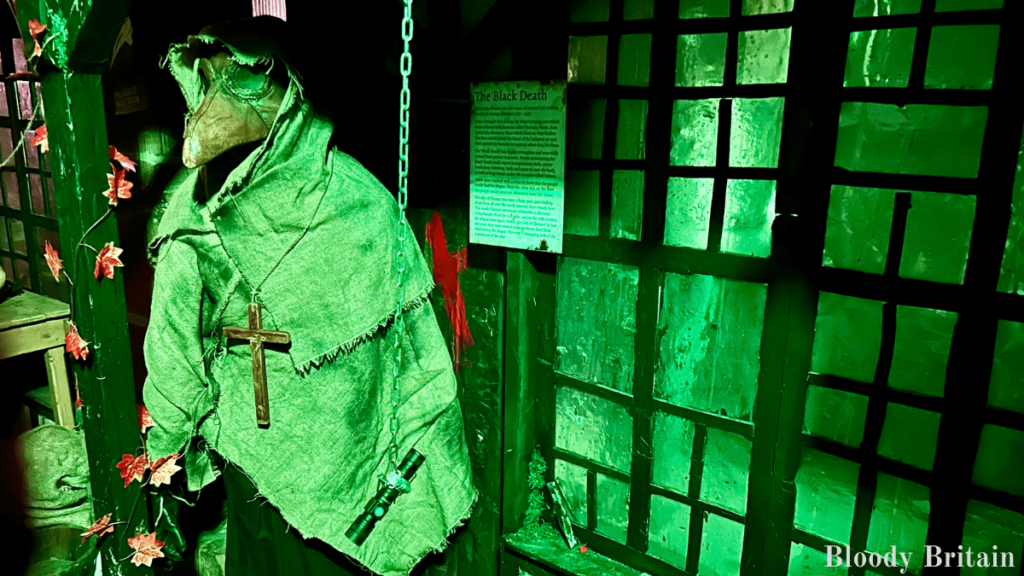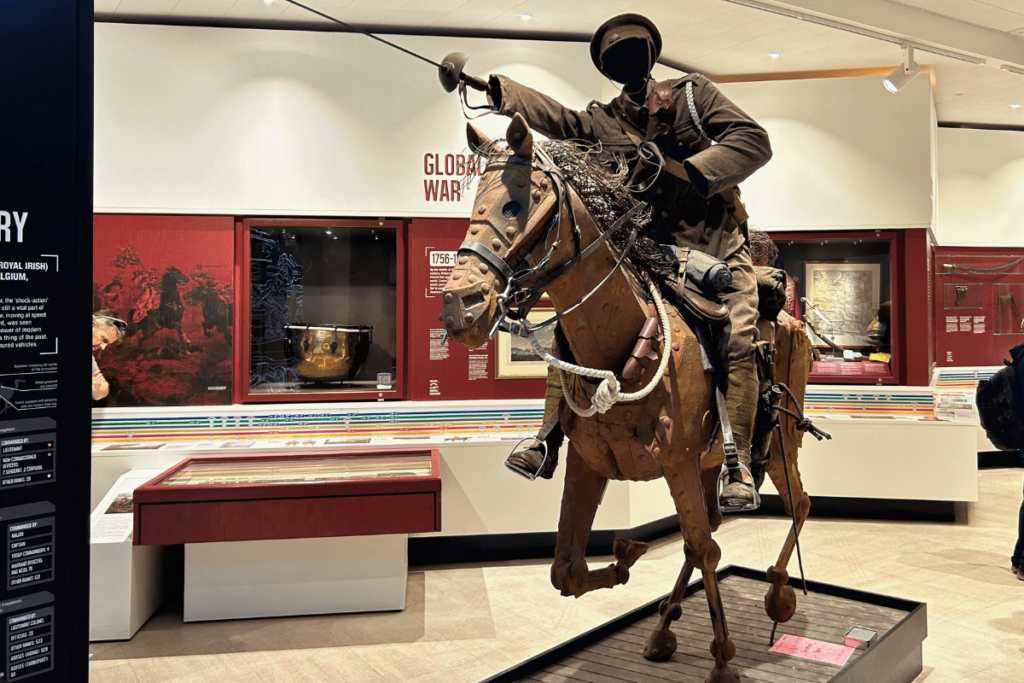Linguistically speaking, the Middle Ages don’t seem like they’d be all that different from the way we speak today. After all, Shakespeare is perfectly comprehensible, right?
To that, we have a couple of retorts. Firstly, Shakespeare post-dates the Middle Ages, Dumbass Hypothetical Reader.
Secondly, even Shakespeare is a tough read, and his stuff is relatively recent. Have you tried to read anything actually from the Middle Ages?
There’s a lot to be said about standardized spelling, and there’s more to be said about the fact that they didn’t have it yet in the Middle Ages.
”The phrase has its origins in the incredible medieval sport of jousting. For those of you who inexplicably haven’t seen either A Knight’s Tale or Game of Thrones, jousting is where two dudes strap on a bunch of armor, grab a lance and shield, and speed towards each other on the Harleys of medieval England, warhorses.”
Go read the Canterbury Tales and try to figure out what the fuck our boy Chaucer is talking about when he writes “[..]bathed every veyne in swich licóur”. Can’t be done. That’s why nobody reads that shit anymore.
That said, a surprising amount of crazy medieval vocabulary (or “vocabullarie” probably, if you’re Chaucer) has made it to the modern age. You’ve been talking that weird Middle Ages lingo all the damn time, and you didn’t even know it.
Up until now. Strap in, esteemed friends and countrypersons, and hark thee unto our ye old liste of medieval phrases that thou still useth.
The Apple Of Your Eye
Everyone’s used this one, usually to refer to a parent who shamelessly favors one of their kids over the others. Usually, a little sister who always gets the best shit at Christmas despite the fact that you’ve been around longer and contribute way more to the family than that spoiled little turd does. It’s fine, though; everyone’s over it now, and there’s absolutely no resentment.

But where did it come from? That’s easy – before real medicine was invented, medieval doctors kinda made it up as they went along. This sometimes worked but generally didn’t and made the problem worse (see: leeches, bloodletting, anesthetic-free amputation). This also applied to the little-known science of ophthalmology, which basically wasn’t a science yet.
Contemporary wisdom held that the pupil was actually a solid sphere of black matter at the center of the eye, not unlike an apple. This was backed up by the esteemed peer-reviewed science journal of the time, the Bible, which had a passage that referred to someone being the apple of someone else’s eye. This led to the modern phrase we have today, which still makes no goddamn sense and definitely doesn’t apply to our little sister.
Full Tilt
While some extant medieval phrases are bullshit and shouldn’t be used by anyone ever, some of them are fucking awesome and should be fit into every possible sentence. One of these is the metal as fuck phrase “full tilt”.

The phrase has its origins in the incredible medieval sport of jousting. For those of you who inexplicably haven’t seen either A Knight’s Tale or Game of Thrones, jousting is where two dudes strap on a bunch of armor, grab a lance and shield, and speed towards each other on the Harleys of medieval England, warhorses.
Knocking the other dude off was called “tilting” him, and this eventually came to represent the sport itself – “jousting” and “tilting” became synonymous. It eventually found its way into the broader lexicon, with another phrase – “tilting at windmills”, meaning fighting an imaginary or exaggerated enemy – surviving into modern English.
Curry Favor is Some Proper Medieval Slang
This one is undoubtedly still in popular use, though it is a total head-scratcher, given the fact that we don’t really use “curry” as a verb outside this one very specific collocation. So, where the hell does it come from?

For a start, let’s get one notion out of our heads – “curry” in this context has absolutely nothing to do with spicy Indian food. It’s actually an archaic verb that means “to groom” (as in grooming a horse, not being a pervert).
The “favor” part of it is even weirder – it wasn’t “favor” at first, but “Fauvel”, the name of a horse from a satirical 13th-century French poem. The name Fauvel was itself a masterclass in sly subversion and satirical mockery, but for the purposes of this article, it suffices to say that Fauvel was a bit of a bad-boy rogue of a horse, and he was susceptible to being flattered. Thus, if you were currying (grooming) Fauvel, you were being nice to him in an attempt to get a favor out of him.
”A side effect of this lovely process is that the phrase survives into modern day English. So, thanks to all the innocent women who died so that we could have a pithy phrase to throw around in corporate boardroom meetings, we guess?”
Educated English people came to know about Fauvel’s poem and began to use the phrase in daily life. This trickled down to the plebs, who began to use the phrase themselves – but incorrectly. The word “Fauvel” meant nothing to them, and it gradually morphed into “favor” – a perfectly cromulent word, given the context in which the phrase was used.
The later use of “curry”, by the way, has absolutely nothing to do with this one – it entered the English language via Portuguese, which itself took the word from Tamil.
Sink Or Swim
This particular phrase – referring to a situation where you can either do a thing or you can’t – is well-known to most people and seems fairly self-explanatory. You’re thrown into the water, and you either sink or swim. What further explanation is needed?

The origin is a little darker than that. It’s a reference to the commonly-used “water ordeal” form of torture/judgment used in the Middle Ages, particularly on suspected witches. It was believed (perhaps erroneously) that witches rejected water as they had rejected baptism.
So if thrown into water, they would float – even if weighted down or prevented from swimming. If they were not witches, meanwhile, then they would sink – proving their innocence but likely drowning in the process.
A side effect of this lovely process is that the phrase survives into modern day English. So, thanks to all the innocent women who died so that we could have a pithy phrase to throw around in corporate boardroom meetings, we guess?
Throw Down The Gauntlet is One of the Many Medieval Phrases Heard Today
Another one that’s rooted in the time of chivalry, throwing down the gauntlet – a phrase that’s come to mean issuing a challenge – involved the literal throwing down of a literal gauntlet.

The word “gauntlet” comes from the French word gantelet, and refers to the armored gloves that medieval knights wore.
Way back when, when a knight had been offended by another – perhaps by leaving a dirty protest in his armor, or something – he would remove one of his gauntlets and toss it to the ground. If his opponent picked up the gauntlet, that meant he accepted the challenge.
Nest Egg
This phrase is mostly commonly used in the modern era by people who’ve bought a second home to rent to poorer people, but its origins are actually much humbler than predatory opportunist landlords. It began with peasants in the Middle Ages.
If you were the type of peasant that kept a hen, you probably made good bank off her eggs. That meant that you were well-incentivized to keep those eggs coming, so you had to make Momma Hen feel as if her constant eggs meant something. Otherwise she might have had an eggsistential crisis or something (sorry).
Medieval peasants would, therefore, commonly leave a single egg in the nest rather than clearing it out completely. This incentivized Momma Hen to keep on keeping on and ensured that that sweet, sweet flow of delicious eggs kept on coming.
This eventually evolved into its current meaning sometime in the 17th century, but never forget that it began way before that as an insidious method of tricking a dumb creature into sacrificing its potential offspring on the altar of human gluttony.
By Hook Or By Crook
This phrase – meaning to get shit done by any means necessary – dates to the 14th century. Unlike many of the other entries in this article, its origins are pretty unclear, with no definitive explanation for how it came about one way or the other.
There are two popular explanations. The first is that it referred to something called an “estover”, which was the allowance of wood that common people were allowed to take from trees. They were, it is said, allowed to gather any branches from trees that they could reach with a billhook or a shepherd’s crook – hence, by hook or by crook.
The second, more interesting explanation is that it came about as a result of Oliver Cromwell’s campaign of suppression in Ireland.
When trying to take the city of Waterford, Cromwell reportedly said that he would take it whether he had to approach from Hook Head (a headland near the city) or Crooke (a village on the other side of the estuary).
This is a neat explanation, but with one flaw – it happened 260 years after the first recorded use of the phrase. Whatever the ultimate explanation, it’s still a pretty cool idiom and it rhymes and everything. Thus, it still gets used.
Old English Words Still Persist to This Day
English is, let’s face it, a truly fucked-up mongrel language. But those mongrel traits make it endlessly fascinating and ensure that we have no small number of crazy etymological stories tucked away behind our weirdest phrases and words.
This list has only just begun to scratch the surface of all this weirdness. Who knows what we’ll uncover in our next one?


